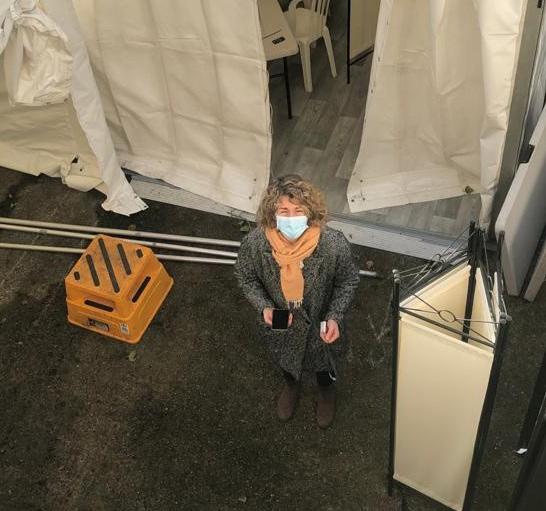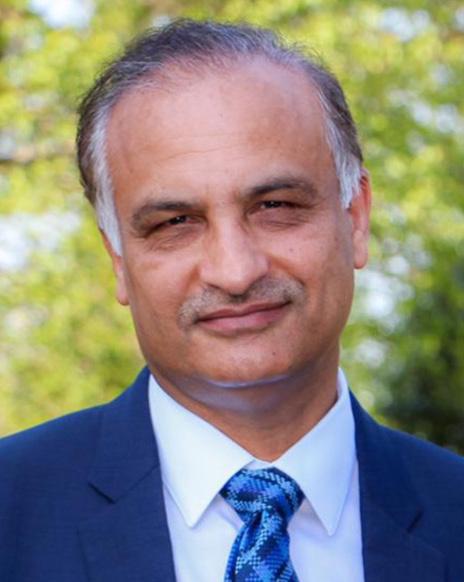
6 minute read
The great GP vaccination effort
from GP Frontline: Autumn 2021
by RCGP
VACCINATING THE UK
The contribution of GP teams in delivering the Covid-19 vaccination programme has been truly remarkable, with three quarters of all vaccinations delivered in primary care.
The College has supported members by highlighting issues publicly and privately that impacted on GPs’ ability to vaccinate – including the supply chain, successfully lobbying to reduce red tape for retired GPs who wanted to return as vaccinators and raising concerns about low uptake in minority ethnic groups.
The College also rapidly developed resources for its dedicated section on the COVID-19 Resource Hub and organised webinars on key topics such as managing anaphylaxis and building vaccine confidence.
Amy Boreham spoke to three GPs from across the UK about their experiences of protecting their patients and communities throughout the pandemic.
In Barnet, Leora Harverd, a GP at Temple Fortune Health Centre, was in the first wave of practices to deliver the Covid vaccination programme. “We were given about 10 days’ notice to prepare. It was a huge leap of faith at the time,” Leora reflected.
On the first day of clinic, 1,200 patients were immunised. However it soon became clear that with the added complexity of creating a Covid secure environment and social distancing, space in the practice was limited.
The resolution proved to be the practice car park. The team set about moving the clinic outside, erecting three marquees which provided the required space to vaccinate patients and accommodate the 15-minute wait for patients receiving the Pfizer jab, as well as toilets and a communal area for staff.
Vaccinating outside at the height of winter was testing. Leora remembered how exceptionally cold it was. “We often had to go inside to warm our hands up on the radiator,” she said.
In total, over 34,000 patients passed through the improvised clinic entrance. Leora says the good uptake was probably due to the high Covid death rate in the community. “I think it really spurred people on to get a jab. There would often be a congregation of patients hoping to get an end of day spare dose.”
Although vaccination rates were promising, Leora and her team put every effort into finding those in the community who were not coming forward or unable to. Saturday nights were filled with vaccinating the housebound and ensuring all key workers in the local area had the opportunity. “We wanted to make sure that all eligible patients, from all walks of life, were offered a vaccine. We took the clinic to the homeless and refugees living in temporary accommodation, as well as vaccinating key workers from local supermarkets and the police station.”
Leora said vaccine supply was the biggest challenge, describing one time when no supply arrived to vaccinate the 1200 patients booked to attend a clinic the following day. “Our supplies had mistakenly arrived at a practice in East London. We drove the 20-mile round trip and ensured that the vaccine was in safe hands, temperature logging it en route.”

Dr Leora Harverd
Leora describes her role in the vaccination programme as a mixture of elation and exhaustion. “The Covid vaccination programme has been all consuming, on top of running day to day general practice, but I don't regret being involved in the slightest. We just want to do our best for our patients,” she said.
Professor Azhar Farooqi, a GP in Leicester and Chair of Leicester City CCG, was concerned about misconceptions, anti-vax messages and fake news about the Covid vaccines circulating on social media. He knew it was fuelling the diminishing numbers of patients getting vaccinated, particularly patients from deprived socio-economic backgrounds and minority ethnic communities. As the city’s Covid-19 cases rocketed, it became the first area to be locked down under the Government's new tiered system.

Prof Azhar Farooqi
“We found the reasons for vaccine hesitancy were mostly confusion about mixing the vaccine with other medication, concerns about fertility, and younger patients with less urgency to get vaccinated”, Azhar said.
The most effective strategy developed and piloted by Azhar and his team was simple – GPs having conversations with patients, advocating the benefits of getting vaccinated and addressing individual concerns. Practice teams were tasked with ringing up patients who hadn't responded to two or three invitations and offering to rearrange appointments. Any patients with lingering hesitancy and questions were booked to speak with their GP.
The scheme was a huge success and had the biggest impact on increasing uptake rates, with two thirds of patients contacted getting vaccinated. "For many a simple reminder from our team was often enough, but also giving patients the opportunity to have a conversation with their GP really helped to instil confidence in the programme. It's a lot easier to change an individual’s perception in this way as the communications can be tailored to address personal needs and concerns" said Azhar.
In total, Azhar’s practice increased vaccine uptake to 95%. The strategy was then rolled out across 50 GP practices in Leicester, combined with further work in the community to debunk false information. This included GPs appearing on community radio stations and participating in Q&A sessions about vaccine safety.
Events were also arranged on social media, including webinars to break down language barriers hosted by multilingual GPs, pop-up vaccine clinics and door to door visits handing out flyers with information about the Covid vaccines.
Over in Northern Ireland, GPs’ involvement in the Covid vaccination programme didn’t begin until January, delivering the Oxford-AstraZeneca vaccine to patients aged 80 and over. "This was mainly because it was better logistically suited to practices, and easier to store," explained Dr Ursula Mason, a GP in Belfast. The following months consisted of GPs and Trusts using a twintrack approach to immunising the rest of the priority groups.

Dr Ursula Mason
Ursula noted the essential work of the Health Social Care Board, working with local GP leaders within the College, LMCs and GP Federations, to act as the main communication hubs during the delivery of the programme. In the early days this was vital as practices faced an unpredictable vaccine supply. "The Health Social Care Boards provided much needed answers about when we could expect vaccine deliveries. In January, for around 10–12 days, supplies dwindled and good communication during these times meant we were able to plan as best we could," she said.
The strong communication and trusting relationships that GPs have with their patients has proved invaluable to good uptake rates. Initially, there was a drop in the number of clinically extremely vulnerable patients taking up the vaccine at Trust sites. "It wasn't until GPs started to offer the vaccine to these patients that we saw an increase in the numbers of patients in this cohort. For many, we've been treating and supporting them for years. We've built up a strong level of trust, and patients feel comfortable to discuss any reluctance or concerns they might have had."
Reflecting on the programme Ursula said; “Overall I felt there was a real sense of enthusiasm from GPs to just get the job done, which has made it even more disheartening to read about the criticism GPs have received in the media over the last few months. It has been challenging to roll out the programme in such a short space of time and continue to deliver care to patients too.”










